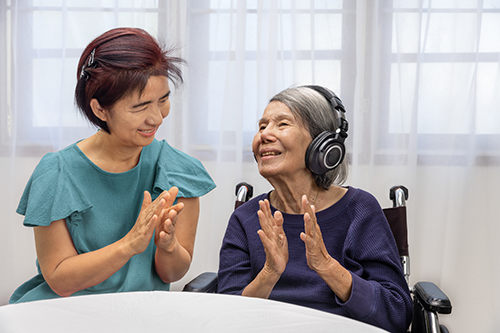



Welcome back to our Winder-area assisted living community and our Winder memory care community’s blog. We manage this blog on behalf of our cherished residents, their families, and of course for you Winder-area homecare heroes taking care of your assisted living and/or memory care loved ones. Today, we hope you might benefit from learning how music can be used as therapy for your memory care loved one.
Music is a powerful art form. Melodies and rhythms can resonate with us on profound levels. That’s because music operates on a subconscious level, gently stroking our emotions as we listen.
Because certain tunes and beats can have an undeniable influence on our feelings, music therapy can be used to help us connect with our emotions and engage with the world around us.
Music therapy can be particularly beneficial for older adults living with dementia.
The magic of music lies in the way it boosts our brain’s neuroplasticity, which is what allows it to change and grow.
The benefits of music therapy and dementia are well researched. Experts tell us that music is processed in several areas of the brain — and by using different pathways to transfer and store information, the memories it conjures are vivid and clear. This positive experience can help ease worry, calm anxiety, and even improve communication.
Memory is like a file cabinet where information is organized and stored for later reference or use. That information includes sights, sounds, tastes, and smells, and those senses play a significant role in our ability to recall specific memories.
Within that ‘file cabinet’, music stimulates the brain’s reward system, releasing healthy doses of “feel-good” chemicals such as dopamine, serotonin, and oxytocin. This can make the retrieval of older memories an easier task for someone with Dementia by stimulating the mind in ways that improve cognitive function, including memory recall.
Consistent stimulation like this means that the benefits can extend beyond the confines of treatment plans and become ingrained in daily life.
Music therapy is all about jumpstarting the brain. For example, rousing music that features fast-paced, immersive beats engages the mind in a way that increases awareness.
But not everyone responds to music the exact same way, and there are different ways to kick the mind into high gear. Some are participatory while others are passive — it’s all about finding what works best for each individual.
Here are three types of music therapy for dementia that work well within a memory care community.
Group Singing
Singing — or Vocal Intonation Therapy (VIT) — uses the power of language and speech to foster orientation. It grounds the participant and gives them a sense of stability in a world that can often feel off-kilter. In addition, group singing (or circle choir) challenges the mind to recall words, phrases, and rhythms in a way that also encourages community and collaboration.
Ensemble Instrumentation
Playing a musical instrument can release stress, and each instrument seems to have its own unique additional benefits. Some are soothing, while others energize the musician. Drumming, in particular, can help patients release anger and frustration in a way that’s healthy and safe for others.
Live Musical Performances
Research shows that musical activities of all varieties (including listening) can influence older adults’ perceptions about the quality of their lives. Simply sitting back and listening to music engages the brain and can reduce anxiety, blood pressure, and pain — as well as improve sleep quality, mood, mental alertness, and memory.
Some of the most effective therapies are simple to accomplish. Give music therapy a try because you both will be rewarded by so doing. As always, remember that when it comes time to enjoy the life changing benefits of professional assisted living services or professional memory care services, we’re here for you.
© 2025 Gateway Gardens at Bethlehem
Web/Marketing Solution Developed and Maintained by WSI Pro Marketing.